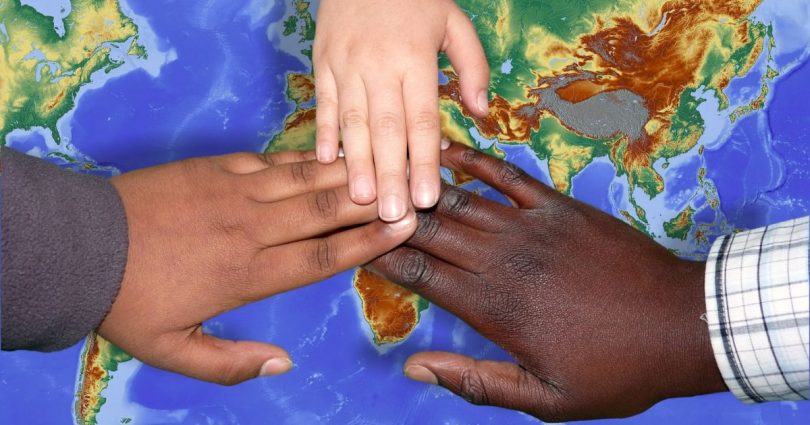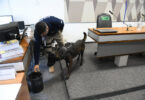Nos Estados Unidos, o mês de novembro está ligado ao feriado de Ação de Graças. É um dia de pensamento contemplativo, misturado com viagens, grandes festas e esportes. No espírito do Dia de Ação de Graças, a T & M oferece este ensaio contemplativo sobre direitos humanos e gratidão.
Funcionários e profissionais do turismo estão observando atentamente o debate sobre a definição de fronteiras nacionais, questões de vistos e questões de acesso gratuito ou menos livre a viagens. Embora essas questões também tendam a estar ligadas à relação entre direitos humanos, direitos nacionais e viagens.
A suposição por trás de todos os direitos humanos é que uma pessoa nasce livre e tem o direito de exercer essa liberdade dentro do estado de direito. Nenhuma discussão sobre direitos humanos e seu impacto sobre viagens e turismo pode ocorrer fora dos pressupostos da liberdade, e a liberdade é frequentemente melhor entendida a partir de sua perspectiva oposta, a da escravidão. Os escravos não têm direitos humanos. São objetos moldados na forma humana, mas sem uma “alma”. Os escravos vivem no eterno presente. Ser escravo é viver no mundo da uniformidade, num lugar igual ao outro, num momento igual ao seguinte. Os escravos não têm direito a sonhos pessoais e os sonhos são a base da liberdade, dos direitos humanos e das viagens.
Em contraste com o escravo, o homem ou a mulher livre se veem como parte de uma cadeia de tradições em evolução. Ser livre é aprender a conectar o passado ao futuro; ser livre é viver não apenas no “aqui”, mas também com o sonho do “lá”. Ser livre é encarar o “outro” e perceber que se tem o direito de interagir com outro ser, em outro tempo e em outro lugar.
É essa suposição de que o ser humano tem o direito de conhecer o outro que forma a base da indústria de viagens. Sem essa suposição, viajar é meramente a transferência de um “aqui” para um “alí” fora do contexto do tempo. Por exemplo, um preso pode ser transferido de um centro de encarceramento para outro, mas a pessoa não é um viajante. Neste caso, o prisioneiro é meramente um objeto sendo movido para a conveniência de seu carcereiro. Da mesma forma, só precisamos olhar para os refugiados em fuga. Embora tenham se movido fisicamente, a expressão vazia em seus rostos é indicativa de que eles foram privados de seus direitos humanos; eles são agora cativos da história, vivendo fora dos limites do tempo e do espaço.
Para ser um viajante, assumimos que possuímos direitos humanos básicos.
Para ser um viajante livre, pressupõe-se o seguinte:
• Há uma razão para ir de um local para outro,
• O viajante ser tratado com respeito,
• O viajante estar livre para circular,
• O viajante tem o direito de encontrar o “outro”.
• O viajante tem o direito de perseguir seus sonhos legais;
• O viajante tem o direito de aprender sobre o passado e contemplar o futuro.
Os nômades do Oriente Médio são um exemplo de um indivíduo verdadeiramente livre. Não reconhecendo fronteiras políticas, o antigo nômade foi para onde seu espírito o movia. Apesar da pobreza implicada na vida nômade, o nômade goza da dignidade inerente a uma alma livre. Em contraste, para o nômade antigo está o homem moderno. Os humanos modernos muitas vezes se sentem cercados por vários fatores que o separam da imagem clássica da liberdade. Os viajantes do século XXI vivem em uma sociedade dicotômica. Por um lado, devido ao transporte moderno, os viajantes e turistas podem ir para onde quiserem. Por outro lado, o turismo deve sobreviver em um mundo de regulamentações. Mesmo nas sociedades mais livres, não podemos simplesmente “nos mudar” de uma nação para outra. Os viajantes precisam de passaportes, geralmente precisam obter e pagar por vistos de entrada e saída, e os viajantes precisam trabalhar em meio a um labirinto de regulamentações e restrições para comprar bilhetes de viagem.
Além disso, com o advento das viagens de massa moderna, a pergunta que deveria ser feita é: “Sobre os direitos humanos de quem estamos falando?” Estamos nos referindo aos direitos do viajante ou da população anfitriã? Por exemplo, os ocidentais geralmente desfrutam da liberdade de viajar para tirar vantagem dos favores sexuais de mulheres asiáticas e homens caribenhos. Muitas dessas mulheres são mantidas em uma realidade próxima da escravidão. Nesse caso, o viajante deixa de ser a vítima, mas se torna pelo menos, parcialmente, culpado.
Se os direitos humanos estão ligados à questão da liberdade, então a questão se volta para a liberdade “de” e para “o quê”. Como a viagem às vezes pode ser definida como a “busca estressante do prazer do outro”, os viajantes buscam o direito de:
• ir onde eles desejam
• falar com quem eles desejam
• ver o que eles desejam
No entanto, qualquer pessoa racional logo concordará que ninguém goza desses direitos sem limites. Uma nação tem o direito de manter os estranhos longe de pontos militares sensíveis? Ou uma religião tem o direito de limitar a entrada em seus lugares sagrados à de seus seguidores?
Pode um governo manter um assassino conhecido longe dos turistas? Uma sociedade tem o direito de promulgar leis de pornografia? Estas são as questões centrais da indústria do turismo e a forma como as respondemos determinará muito o futuro da indústria.
Para complicar ainda mais a questão, não existe uma definição de “direitos humanos”. Os “direitos humanos” dá o direito de viajar para onde se deseja ou o direito de deixar a nação, ou são direitos humanos nada mais que o direito de escolha? Desde a comida que se come, a cor da roupa que se veste e o direito de respirar o ar sem medo. Se o primeiro se encaixa na definição, então muitas nações não têm direitos humanos. Se, no entanto, esta última forme nossa definição, então as nações que proíbem o uso da carne suína, os sistemas escolares que exigem um uniforme escolar e os lugares cheios de ar poluído também carecem de direitos humanos.
Neste mundo de viagens constantes, para que os profissionais de turismo mantenham uma indústria viável e confiável, eles devem começar a responder perguntas como:
· Quais são os direitos da sociedade de acolhimento?
· Quais são os direitos do viajante?
· Quais são os direitos da indústria de viagens e turismo?
· Quando o bem comum de restringir viagens supera os direitos do viajante individual?
Finalmente, precisamos nos fazer perguntas como: o que é viagem e como ela difere da emigração, turismo e viagens de negócios? Cada tipo de viajante deve ter a mesma quantidade de direitos? Se não, por que uma forma de viagem tem precedência sobre outra?
O autor deste ensaio é desconhecido para mim, eu o modifiquei e expresso meus agradecimentos a todos que contribuíram para isso.







